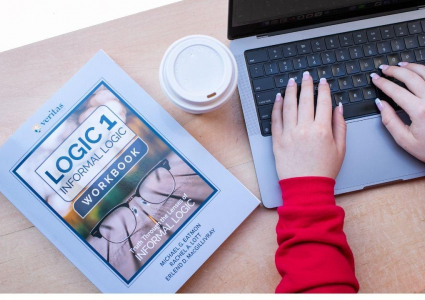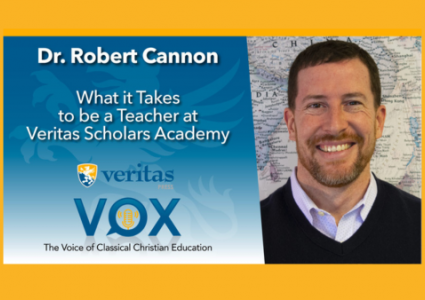Omnibus - Helping Students Find Freedom

Minimalism is a trend that seems to have gained some attention and prominence in current culture. Ideas such as tiny homes, traveling abroad, remote jobs, and blogging are often connected to this idea. One minimalist blogger opines that many believe in order to be a minimalist you must “live with less than 100 things, you can’t own a car or a home or a television, you can’t have a career, you must live in exotic hard-to-pronounce places all over the world, you must start a blog, and you can’t have children.” While sometimes characteristic of a minimalist lifestyle, the blogger goes on to explain that these elements are not “requirements” to be a minimalist. Rather, the author argues that minimalism is a tool that can assist a person in finding freedom. Another minimalist blogger echoes this belief when he writes, “Minimalism is a way of eschewing the non-essential in order to focus on what’s truly important, what gives our lives meaning, what gives us joy and value.” He goes on to argue that having less actually provides more. Minimalism is a process of “clearing away all but the most essential things — to make room for that which gives us the most joy.”
While this idea of “less is more” seems to be a modern trend, the wise Preacher (aka Solomon) reminds us that there is “nothing new under the sun.” The astute student will recognize modern minimalism as an idea articulated by Pliny the Younger, a first century Roman author and administrator who left a collection of private letters that intimately illustrated public and private life in the heyday of the Roman Empire. He is credited with coining the Latin phrase multum non multa which is translated “much, not many”. As the grammarians in the crowd will gladly explain, the distinction between “much” and “many” is profound. “Much” refers to a more abstract quality – like virtues, education, knowledge, wisdom, etc. – while “many” helps to quantify tangible, countable, material things. This concept has been adapted through familiar English proverbs such as “Quality over quantity” and “Less is more”. This principle encourages people to privilege depth and quality over breadth and quantity.
I am not here to argue that we all should become Minimalists! I will leave that decision to your own determination. However, the multum non multa principle can be a helpful tool to evaluate how to approach education. I often hear parents, students, teachers and administrators exclaim how busy they are, and they are in a quandary how that will get it all done. A quick review of the daily and weekly schedule for most schools sheds some light on this perception.
From my experience, schools are in operation around 7 hours per day, 5 days a week. Students will spend 1-3 hours per day just in personal preparation and travel activities. In addition, 2-4 hours are spent on daily homework; and, similar demands are often expected over the weekend. Add to the schedule school-related events and extra-curricular activities, personal and family time, church-related activities, and part-time jobs. After a weekend crisis breakdown, one Student Government president shared in her college newspaper, “Society tells us that hard work looks like a constant push, and without it, we will not be successful, intelligent or hirable….Busy culture stifles the American mind while pressuring us to do more. As a society, we must choose to reform it.” Add to the stress of time pressure, students in the K-12 school may study 6-10 different subjects that they need to learn well enough so they can “pass” the class and “be promoted” to the next level.
Teens and college students, in particular, can easily feel stressed and anxious trying to juggle school, work, friends, and family while trying to figure out the rest of their life. In fact, the Anxiety and Depression Association of America (ADAA) reports that 50% of all lifetime cases of mental illness begin developing by age 14 while 75% of such cases begin developing by age 24. But, it’s not just students who experience this busyness; parents, teachers, and administrators are also engaged in this societal expectation. A quick Google search reveals numerous articles and posts that busyness and overwork have become status symbols in our culture. In fact, this penchant for excessive work has earned the moniker “busy brag”- protection of status for those who are physically capable of shouldering a bruising schedule. Is it any wonder that anxiety and depression are so prevalent in our society. According to the ADAA an estimated 32% of adolescents have an anxiety disorder.
Have you experienced this malady in your community? I wonder if this awareness provides an epiphany for how to alleviate the situation. Maybe students need more time to wonder!
It was during my quest to address this unsettling condition for my own students that I was introduced to the idea of multum non multa. I was presented with a challenge to find ways to reduce student workload and time pressures while still covering the necessary material to prepare them for “promotion”. During this pursuit I came to understand that busyness is a modern invention. Over the last 150 years, the idea of leisure has been replaced by the concept of “total work”; we have become a leisure-less society that is focused on making everything work, even our “leisure time”.
In his work, Leisure, the Basis for Culture, Josef Pieper argues that leisure is the antidote for reclaiming human dignity in a culture of compulsive workaholism. Pieper distinguishes “leisure” from “idleness” when he writes that “lack of leisure, an inability to be at leisure, went together with idleness; that the restlessness of work-for-work’s-sake arose from nothing other than idleness.” Writing in 1948 Pieper noted that leisure also sits in contrast to work. He calls the reader to “realize how extensively the opposing idea of “work” has invaded and taken over the whole realm of human action and of human existence as a whole.” To accentuate his point, Pieper demonstrates that the Greek word for “leisure,” σχoλη (scholé), produced the Latin scola, which in turn gave us the English school. Based on previous information, anyone would be hard-pressed to prove that modern education is an exercise of “leisure”.
Armed with a fresh understanding of “school”, I began to look for ways to provide a more “leisure” focused experience in my classroom. I wish I could report that I solved the problem; sadly, I haven’t achieved that expert level...yet! However, I did discover some ways to reduce the workload for students and still make them well-prepared to advance in their studies. And, it follows the principle of multum non multa. I began to look for opportunities to improve quality over quantity by seeking to do more with less.
Primarily, I sought to have fewer segregated subjects that contained vast amounts of unrelated material and information. A key to this approach is integration--looking for ways to cover common material that can be addressed in multiple subject areas. In my case, having a history-centered curriculum provided a common denominator that provided numerous opportunities to overlap lesson planning. Writing, spelling, and vocabulary were easily integrated across multiple subject areas. Even though dedicated time is necessary to introduce particular concepts, the other subjects serve as the means to practice and review the skills and knowledge. So, while students were studying for these subjects, they were also thinking about literature, history, grammar, math, science, etc. We began to focus on much, not many.
Simultaneously, the use of activities and projects allows students to learn with a sense of leisure. As they eat Phineas Fogg’s daily meal at precisely 11a or cook a cowboy stew over a campfire, their experience imbeds knowledge and understanding that may never be accomplished with hours of homework. Preparing for a debate or science fair can be utilized as an opportunity to improve writing, research, spelling, grammar, and vocabulary skills. Please note, I propose these suggestions as classroom activities and not simply projects that are sent home for parents to figure out the night before they are due!
One resource, in particular, that greatly assisted in the pursuit of multum non multa, is the Omnibus curriculum published by Veritas Press. Designed for 7th-12th grade students, Omnibus employs the reading of the Great Books in order to teach a plethora of knowledge and skills. It seeks to help inculcate the tools of learning. On the surface, Omnibus may seem like a tall stack of books that will be a challenge for even the best student to conquer. It may appear that we are really exacerbating the stress and anxiety challenges already discussed. And, this point holds merit if Omnibus is viewed as just another subject to be added to the class schedule. I can attest from personal experience, more than one student has suffered great stress and anxiety from this ill-advised approach. However, Omnibus is not just another subject.
It is best to view Omnibus from the eyes of Pliny the Younger--breadth will be achieved by accomplishing depth. First of all, students who study all six levels of Omnibus will have covered a thorough study of History, Literature, and Theology from the Ancient World to the Modern World. This approach provides a 3-for-2 subject exchange which helps to begin reducing the segregated subject schedule. Secondly, the “literature” readings are aligned with the “history” readings so that desired integration is taking place. As students read and study, they are digging deeper and reinforcing similar ideas and information. Third, the lessons employ a variety of activities and exercises to instill the tools of learning. Tools are introduced and practiced as students read the Great Books. Student-led discussions, essay writing, recitations, and debates are useful to stir up a love for reading and learning.
Students become engaged in identifying problems as the teacher asks questions and “stirs up” discussion. As students interact with the Great Ideas, a dis-equilibrium is created that challenges their beliefs in order to strengthen their understanding and communication skills. Over the course of study, students will cover the elements of the progymnasmata, a set of preparatory exercises set up to train students of rhetoric for the composition of prose and performance of practical orations. Students are trained to fight....winsomely.
It is evident that Omnibus covers a vast territory of learning. And, this approach often creates a quandary for the modern mind. If we take on this study how will we ever cover all of the electives and have students prepared for the standardized testing? How is a student going to be prepared for the rigors of college and career choice? To the point, we must remember the cry of Pliny the Younger, multum non multa! Students will actually be better prepared with quality over quantity. And, the stress and anxiety levels are lessened as well! You may read more about the benefits of Omnibus by clicking the link.
I would like to offer three contemporary “witnesses” to corroborate these claims. First, a graduate from our Veritas Scholars Academy (VSA), Pvt. Joseph A. Kemp. Pvt. Kemp recently wrote a letter to current students as an encouragement to do their best and study well. “I’ve graduated, and I can already see how studying for omnibus can help you out in life….Omnibus is known for making people think better. I got the highest ASVAB score in the state of Missouri when I decided to join the Marine Corps. You can get a good job if you take this opportunity to start the habit of studying.” Thanks for your testimony and your service to our country, Pvt. Kemp!
The next witness is a VSA family whose Veritas Story was recently shared on our Facebook, the Cummins family. As they recounted the educational progress of their three children, they commented, “[Our oldest daughter] has an amazing ability to place current thought and events within the broader historical context. This is not just motherly bias; I hear the same level of awareness from her classmates. One of the great joys of this stage are the lively and thoughtful conversations around our table especially when we have extended family or guests. Another joy is listening in on live class debates and discussions as the students learn to logically and respectfully disagree with one another.” Further on in the letter they also remarked, “[Our children] enjoy talking together at their varying depths about historical events, musical periods, artistic styles, big ideas, and favorite authors in common.” Is this the feedback you commonly hear from parents about their child’s experience at school?
Finally, Mark Cuban - American entrepreneur, billionaire “Shark Tank” investor, and owner of the NBA Dallas Mavericks - weighs in on the matter at hand. In a February 2017 interview with Bloomberg’s Cory Johnson, Cuban was commenting on the advice he had recently given to President Trump about manufacturing. In his view, as artificial intelligence and machine learning takes center stage, there will be a greater need for expertise in subjects such as English, philosophy and foreign languages. "I personally think there's going to be a greater demand in 10 years for liberal arts majors than there were for programming majors and maybe even engineering," he said. "When the data is all being spit out for you, options are being spit out for you, you need a different perspective in order to have a different view of the data." It appears Mr Cuban might recommend hiring a student who has been prepared through the Omnibus study!
Veritas Press is committed to helping students learn well in the way they learn best. It is not necessary to become a Minimalist in order to be a well-educated student. However, according to Pliny the Younger’s motto, multum non multa, it may be beneficial to approach learning with a Minimalist’s mind set by “clearing away all but the most essential things — to make room for that which gives us the most joy.” When used appropriately, Omnibus will enable students to learn more by studying fewer subjects. They will again enjoy the leisure of wonder. Call today to schedule a free consultation to see how Veritas Press can help you and your student(s) implement Omnibus as a tool that can assist a student in finding freedom.
Would your student(s) benefit from our Omnibus Self-Paced Courses? Check them out and try them out, free for two weeks. And, don't miss our Self-Paced Course promotion. Between now and March 16th, 2020 you will save $100 off of every Self-Paced Course you purchase.







